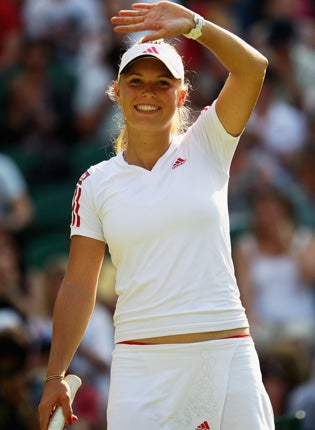Wozniacki offers glimpse of life after the Williams sisters
The Danish teenager has great potential but she must first deal with Germany's Sabine Lisicki in a mouthwatering fourth-round match today, writes Brian Viner

With the Williams sisters powering with seemingly relentless momentum into the second week, it is hard, possibly even foolhardy, to look beyond them for the woman who will lift the Venus Rosewater dish on Saturday afternoon.
But look beyond them we must, if only to a time when they have quit the Wimbledon stage for good. And in any glimpse into the future of the women's game, Caroline Wozniacki and Sabine Lisicki, respectively raised in Denmark and Germany but both the daughters of Polish expatriates, loom large. It will be a surprise if neither of these exceptionally talented teenagers ends up gracing the All-England Club honours boards, and it could even be that one of them will disrupt the inexorable march of Venus Williams towards the final. As for which one, that will be decided by what could be a pippin of a fourth-round match today.
Both girls produced marvellous tennis on Saturday, although the unseeded Lisicki, yet another product of the assembly line that is the Bollettieri Academy in Bradenton, Florida, accounted for a much more illustrious name, inconsiderately wrecking the 24th birthday of the French Open champion Svetlana Kuznetsova with a 6-2, 7-5 victory. However, Wozniacki, seeded nine, looked in formidable form in defeating the 20th seed, Annabel Medina Garrigues, 6-2, 6-2. And having won the Aegon International in Eastbourne just prior to coming to Wimbledon, the 18-year-old is now unbeaten in eight matches on grass.
If she makes it nine, the Danish press corps will get to extend their stay in London. Many of them intend to pack their bags as soon as she loses, so synonymous has her name become with tennis back home. "It's not that we won't be interested in the rest of Wimbledon, but we will be able to cover it by watching on television," a journalist from Copenhagen told The Independent yesterday.
It is hard even for the British, who dump expectation like gravel from the back of a tipper truck onto the shoulders of any compatriot who shows significant talent, to understand Wozniacki's rising stature in Denmark, where, with the possible exception of The Little Mermaid, no female is more famous.
But to put it into context, if a list of great British tennis players of the past 50 years could go on the back of a beer mat, a list of great Danish players could be written on the back of a stamp, in marker pen. Before Wozniacki, no Dane in the Open era has made it beyond the round of 32 in a Grand Slam event, and even going further back, encompassing all of what might be called the open sandwich era, only one Danish tennis player has made any kind of impression. That was Kurt Nielsen, who was beaten in the men's singles final at Wimbledon in 1953 and 1955, and won the US Open mixed doubles title in 1957, with Althea Gibson.
Otherwise, the Danes have looked enviously across the Oresund, the narrow strait that separates them from their nearest neighbours, at the sporadic but sparkling success of Sweden. Without any home-grown inspiration, recreational tennis in Denmark has been in decline for decades, yet Wozniacki's emergence has reversed the trend. The public courts are full again. And if the youngster has some way to go before rivalling footballer Michael Laudrup as the most popular ball player the nation has ever produced, in terms of individual sports, nobody is more admired.
It helps that she is attractive, friendly and wholesome, and her recent admission that she has never been drunk caused a minor sensation in a country where teenagers are often as pickled as the herrings. There was also great excitement when she was romantically linked with Rafael Nadal last year.
All that really matters, however, is the ever-burgeoning quality of her tennis. In beating Medina Garragues she showed the extent of her repertoire, which relies on finesse as much as power. And, particularly refreshing at these championships, where several women's matches have seemed to have a bleating goat on one side of the net, and a woman in the final stages of childbirth on the other, the only noise she makes is a little "pffff" of exertion.
As for Wozniacki's style, the unusually flat trajectory with which she hits the ball yields more than her fair share of net cords. Lisicki, though, had her measure in the final of the clay-court Family Circle Cup in Charleston, South Carolina, two months ago, winning 6-2, 6-4. That was the 19-year-old German's first WTA tour title, and she won it without dropping a set, not even to her third-round victim, a certain Miss V Williams. Prior to that Lisicki and Wozniacki had met only once, in the third round of last year's Australian Open. The Dane triumphed that time, in three sets. So they stand 1-1 in career head-to-heads, although that is the least of the numerous reasons why today's encounter is such an appetising one.
Before Caroline: Other great Danes
*The 1992 Danish football team: Denmark were triumphant in the 1992 European Championships, defeating Germany 2-0 in the final. It was an astonishing achievement considering Denmark did not qualify for the Championships, and only took part because Yugoslavia withdrew from the competition.
*Bjarne Riis: The cyclist won the 1996 Tour de France. However in 2007, he admitted using banned substances to assist his victory.
Join our commenting forum
Join thought-provoking conversations, follow other Independent readers and see their replies
Comments
Bookmark popover
Removed from bookmarks